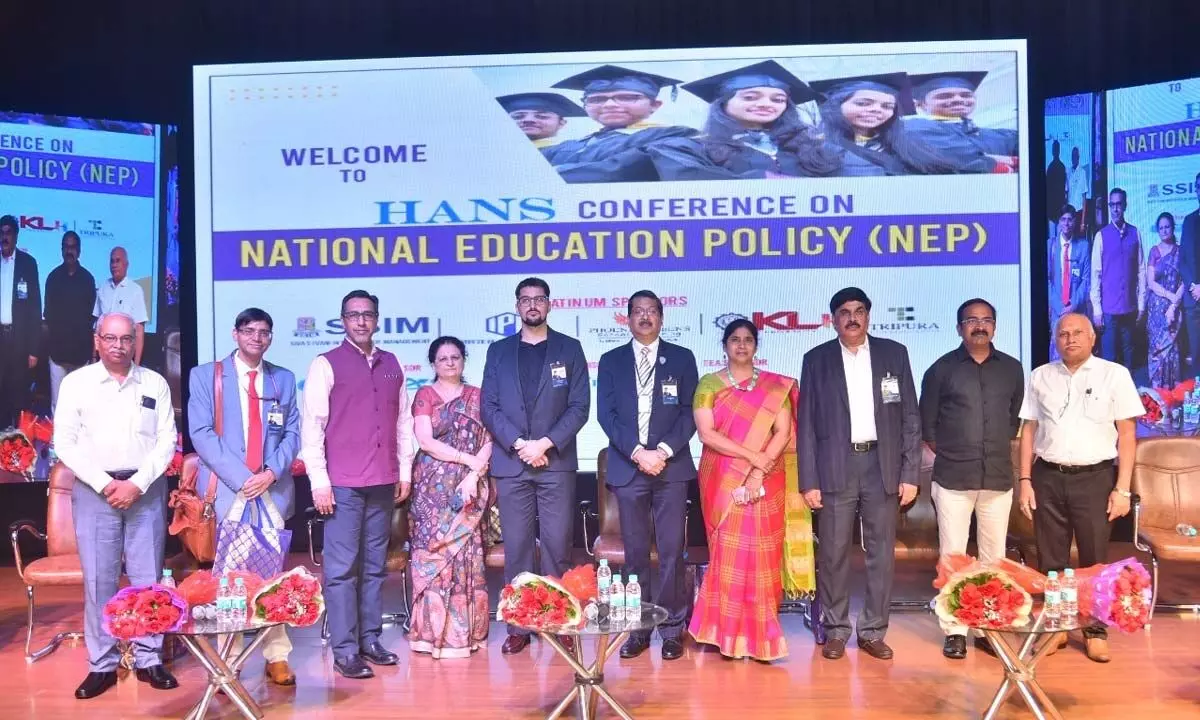NEP IS empovering education to produce innovation

First session of Hans India’s NEP conference concludes on good note
Speaking at the conference on 'National Education Policy (NEP)' organised by The Hans India, panelists said that the NEP is inclusive as it involves everyone, with specific strategies that will be created to reduce drop-outs in SCs, STs and OBCs.
Hyderabad: Speaking at the conference on 'National Education Policy (NEP)' organised by The Hans India, panelists said that the NEP is inclusive as it involves everyone, with specific strategies that will be created to reduce drop-outs in SCs, STs and OBCs.
More than 500 students attensedt the first day session and panel discussion on NEP. Participants were also from various educational institutions, firms, and consulatants were present.
The NEP 2020 will produce millions of skilled workers, entrepreneurs, innovators and researchers. The NEP is a need based on the pillars of access, equity, quality, affordability and accountability. They said that the outcome of NEP teaches to transform education to empower and learn to lead.
The first panel session of a conference on 'National Education Policy (NEP)' organised by The Hans India started at 12 pm on Saturday at Shilpakalavedika and went up to till 1 pm. With one of the best educationalists from popular universities and educational institutions participated in the panel session focusing on 'Implementation of NEP - student-centric, creative-centric, Innovation-centric". They also added one more term 'research-centric' focusing and motivating students and participants to opt for research.
The first panel session of the conference was moderated by Dr Buddha Chandrashekhar, Chief Coordinating Officer of AICTE, Ministry of Education and panelists were Dr Srikanth Sinha CEO of TASK, Dr V Balakista Reddy Registrar of NALSAR University of Law, Dr Rama Shankar Yadav Assistant Professor HRM of Indian Institute of Management Rohtak and Anju Sharma Principal of Phoenix Greens International.
Dr Srikanth Sinha CEO of TASK said, "In this era of knowledge where learning, skilling, up-skilling, research and innovation bare important. The NEP will transfer India into an innovative knowledge hub and it is also filling the gaps in the education system. Even a B Com student should also be aware of technology."
Answering to a question, Dr Sinha said that to improve the number of patent rights can also be increased by students carrying out innovative things developing various. Need to identify the skills of students will help them come up with creative and innovative things and soon after higher education the job seekers in the country will be job makers.
Dr V Balakista Reddy Registrar of NALSAR University of Law, Hyderabad said, "India is going to play an important role in education system across the world, with the NEP the students will get lots of opportunities. Today we are now living in a multidisciplinary time, lots of technologies are being utilised and innovations are bein done in the law but the balance need to be done when it comes to the law because justice hurried is a justice buried."
Dr Rama Shankar Yadav Assistant Professor HRM of Indian Institute of Management Rohtak said, "Inclusion of every individual in a classroom should be included by involving students in discussions, NEP makes education skill oriented, outcome based, experiential, discussion based and flexible."
"NEP is empowering education to produce innovation, it is also meaningful learning, critical thinking, examination reforms including internships and employability. Technology plays a major role with implementation of NEP students will also have skill along with their degree, a skill that will be very helpful for job seeking," said Dr Buddha Chandrashekhar, Chief Coordinating Officer of AICTE, Ministry of Education.
Anju Sharma Principal of Phoenix Greens International said, "NEP has simplified the school education: early childhood education, learning in the formative years. The school students will also multiple skills that will help them in the future."
The panelists of the first session also felt that the NEP is adaptive, learner centered, promotes ed-tech companies, free high technology, personalised and customised. The said that up-skilling is very important to enhance employbility opportunities for students.
All panelists suggested participants and students to think logically, innovation, creativity and an ability to solve real life problems remain the most prized skills in today's economy.
At the end of the session all five panelists took questions from students who attended the session from various colleges and universities. The students got clarification on NEP as all their answers related to various fields like artificial intelligence (AI), enginnering, pharmacy and health care.








